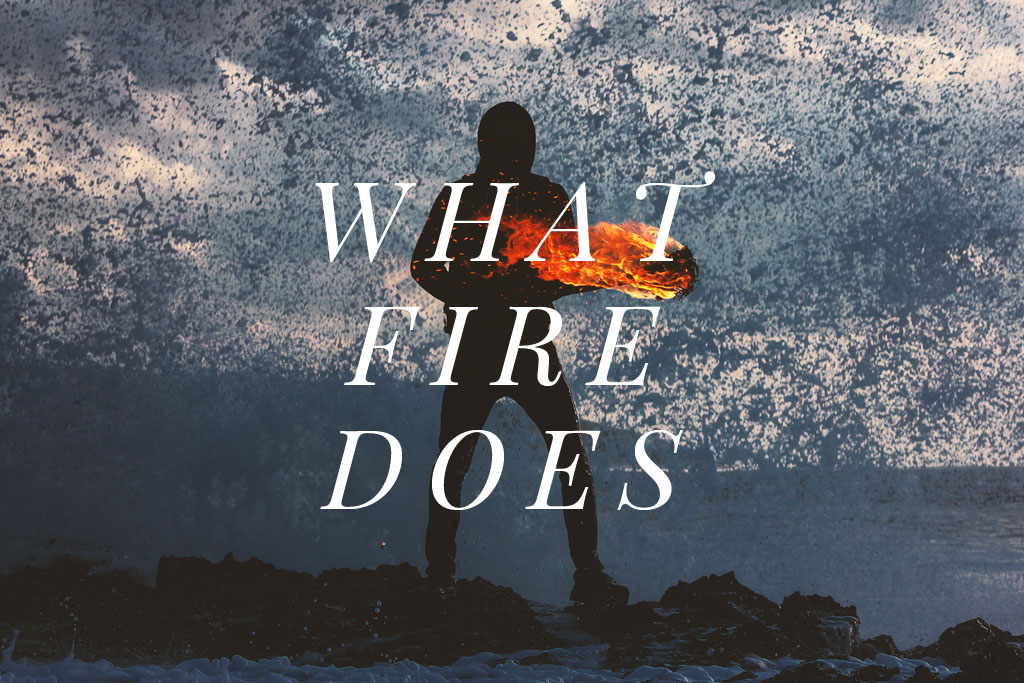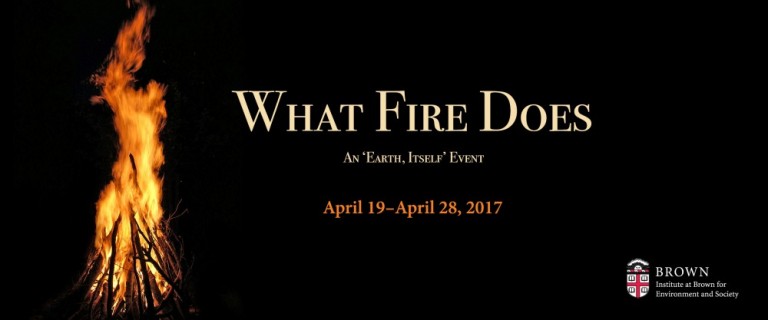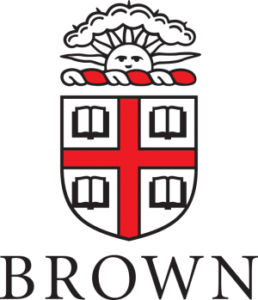What Fire Does
2015 Thinking the Earth

What Fire Does
an Earth, Itself event | 2017
FROM TORCH LIGHT TO SCORCHED EARTH
An
Overview
From 2015-2018 the Institute at Brown for Environment and Society sponsors an interdisciplinary program under the title of “Earth, Itself,” designed and convened – by Lenore Manderson – to stimulate conversations and collaborations across the natural and social sciences, humanities and the arts.

What Fire Does will be held primarily from April 18-28, 2017, and will focus on the productive, creative, destructive, and transformative powers of fire. The creative arts are the ‘fire arts’—particularly ceramics and glass—with exhibitions and performances conducted in collaboration with RISD (Rhode Island School of Design).
The keynote speakers will be Stephen J. Pyne (Arizona State University) and Pamela H. Smith (Columbia University).
Academic panels, lectures and symposia, to be held across departments, will include the unintended consequences of fire fighting and soil contamination; fire on ice—the role of fire in early human migration and settlement in the Paleolithic period; and, in collaboration with the John Carter Brown Library, an afternoon panel on the Americas and the generative power of fire. Brown students will be composing pieces for the 2017 WaterFire festival, with its premiere at 2017 Commencement (May 27).
We are collaborating again with Magic Lantern for an evening of Films on Fire, and we will be hosting a poster competition.
The program was open to students and faculty, policy makers, community members, and others who care about the environment, and thrive on scientific discovery, debate, controversy, stories, films, and the visual arts.
April 19-28, 2017
Brown University
Providence, RI
United States of America
The
Schedule
Exhibition: America on Fire
John Carter Brown Library
All Fired Up
1:15pm (RISD Metcalf Auditorium – Chace Center (RISD Museum), 20 North Main St):
Keynote Address: Fire and Transformation in Early Modern European Art and Alchemy, Pamela Smith
Earth, Water, Air, and Fire were conceptual building blocks in early modern European views of nature, and, at the same time, fire was an everyday agent of transformation in all realms of early modern life, from quotidian charcoal making and other forms of utilitarian knowledge about fire and fuel, to metalworking practices, to the language of alchemical allegory. The lecture will survey these areas and focus in on the mental world of metalworkers whose work with fire involved a material network of transformative substances, including red pigments, blood, gold, and lizards.
· Introduction: Lenore Manderson
· Chairperson: Rachel Berwick (Glass, RISD)
Fire, Unintended Consequences, and Environmental Justice
Sponsors: IBES, Brown Superfund Research Program and Department of Sociology
2:45pm (IBES 101-102, 85 Waterman St):
Coffee, Tea, and Light Fare
3:00pm (IBES 130, 85 Waterman St):
Symposium
Moderator: Scott Frickel
Panelists:
· Alissa Cordner, Fighting Fires in a Risky World
· Elizabeth Hoover, Pyropolitics and Water Protectors at Standing Rock
· Peter Little, Pyropolitics in Ghana’s E-Waste Scrapyard
· David Pellow, The Fiery Politics of Ecological Justice: Wildfires and Arson, from the Suburbs of Southern California to the Radical Ecological Movement
The Fire Arts
Sponsors: IBES, the Ceramics and Glass Departments and the Nature Lab of RISD
5:30pm (RISD Nature Lab, 13 Waterman St):
Opening Remarks: Amanda Lynch
Exhibition: Structure and Growth, David Katz
Reception
7:00pm (RISD Metcalf Building, 4th Floor, 7 North Main St):
Hot Nights, Glass Department of RISD
RISD Glass initiated Hot Nights as a means of cultivating a greater understanding of glass and its significance to an array of disciplines. Through a series of hot shop demonstrations, projects, and workshops, Glass faculty and students partner with the larger community to research and experiment the intersection between glass and its ubiquitous presence in the world.
Creative Ecologies
Sponsors: IBES and Modern Culture and Media, Brown
3:30pm (IBES Lower Lobby):
Coffee, Tea, and Light Fare
4:00pm (IBES 015):
Symposium: Elemental Affinities: Ecological Questions for Film and Media
Moderator: Brett Zehner
Panelists:
· Jessica Bardsley, Mortal Water: Process, Time, and Elemental Cinema in Roni Horn’s Water, Selected
· Cassandra Guan, Critique of Flowers: Ecology and Affect in the Age of Technical Reproduction
· Thomas Patrick Pringle, The Condition Consistent: Digital Media Aesthetics and Climate Change
· Caufield Schnug, The Wind in the Trees: Aura, Stimmung, and Cinematic Atmospheres
7:30pm (Cable Car Cinema, 204 South Main Street):
Magic Lantern, Films on Fire
Curator: Thomas Pringle
Fire and Human Settlement in Antiquity
Sponsors: IBES, Department of Earth, Environmental and Planetary Sciences (DEEPS), The Joukowsky Institute for Archaeology and the Ancient World, and The Haffenreffer Museum of Anthropology
2:30pm (IBES 101-102, 85 Waterman St):
Coffee, Tea, and Light Fare
3:00pm (IBES 130, 85 Waterman St):
Symposium
Moderator: Lenore Manderson
Panelists:
· Yongsong Huang, Fire, ice and mystery of the first American settlers
· Kevin P. Smith, Volcanos, fire and ritual in early Iceland
· Peter Van Dommelen, Living with Fire: Ceramic Production in the Ancient Mediterranean
· Felipe Rojas, Fire-thieves in the Caucausus: Ancient Myths and Cultural Contact
· Bob Preucel, Impacts of the Las Conchas Fire on Cochiti Pueblo Sacred Landscape
Brown on Fire
3:00pm-4:00pm (IBES Foyer, 85 Waterman St):
Poster Session
Sponsors: IBES and Department of History
4:00pm-6:00pm (IBES Foyer & IBES 130, 85 Waterman St):
Keynote Address: Fire: A Biography, Stephen Pyne
· Chairperson: Robert Self
Livestream
Fire has existed on Earth since plants colonized the continents. A major phase change in its history occurred when a creature, ourselves, learned to exploit it deliberately and eventually assumed a species monopoly over its use. We got small guts and big heads because we learned to cook food. We went to the top of the food chain because we learned to cook landscapes. And now we’ve become a geologic force because we’ve begun to cook the planet. Today, the Earth divides into two grand realms of combustion – one that burns living landscapes and one that burns lithic ones. We now have too little of the right kind of fire, too much of the wrong kind, and too much combustion overall.
Reception and announcement of poster competition winners
The Americas and the Generative Power of Fire
Sponsors: IBES, Department of Anthropology and John Carter Brown Library
3:00pm (John Carter Brown Library):
Symposium
Moderator: Neil Safier
Panelists:
· Andrew Scherer, Ceremonies of Smoke and Flame among the Ancient Maya
· Matt Liebmann, When the Little Firekeeper Ran Away: Pueblo People, Franciscan Missions, and Wildfires in 17th Century New Mexico
· Guilhem Olivier: The New Fire Ceremony: Religion and Power in Ancient Central Mexico
· Alessandra Russo, Fury and Beauty: Fire in the Limits of Conquest
Curating America on Fire
Curator: Jake Frederick
5:00pm (John Carter Brown Library):
Closing Reception
Exhibition Opening, America on Fire
· Introductory Remarks: Jake Frederick and Neil Safier
5:45pm (John Carter Brown Library):
Performance: Fire Away, Wendy Woodson
Reception continues
Music (Joshua Tucker, Butch Rovan)
Brown Arts Initiative (Butch Rovan)
WaterFire Festival (Barnaby Evans)
Premier of new works at the opening WaterFire Festival
The
Presenters
LENORE MANDERSON is Distinguished Professor of Public Health and Medical Anthropology in the School of Public Health, University of the Witwatersrand, Johannesburg, South Africa, and Visiting Distinguished Professor in Environmental Studies in the Institute at Brown for Environment and Society, Brown University, Providence RI, USA. Earth, Itself aims to nurture conversations on environmental change and sustainability between the natural and social sciences, humanities and creative arts. She also teaches a course on biodiversity loss, climate change and innovation in the IE/Brown Executive MBA. In 2016, she was a recipient of the Career Achievement Award of the Society for Medical Anthropology, American Anthropological Association, honoring her work over 40 years.
STEPHEN J. PYNE is one of the world’s foremost experts on fire. A MacArthur Fellow and a former professional firefighter with the National Park Service, Pyne is the author of more than twenty books about the social and environmental history, and the management, of fire. He has dedicated his life to the study of humankind’s complex and multi-faceted relationship with fire, through wide-ranging books, lectures, documentary films, consulting work, and interviews. A small sample of his books includes Fire in America: A Cultural History of Wildland and Rural Fire (1982), Fire on the Rim (1989), Burning Bush: A Fire History of Australia (1991), World Fire: The Culture of Fire on Earth (1995), Tending Fire: Coping With America’s Wildland Fires (2004), Awful Splendour: A Fire History of Canada (2008), and Between Two Fires: A Fire History of Contemporary America (2015). Pyne is Regents Professor in the School of Life Sciences at the University of Arizona, and when he is not traveling the world studying and discussing fire, he teaches environmental history, the history of science and exploration, and nonfiction writing.
PAMELA H. SMITH is Seth Low Professor of History and Director of the Center for Science and Society at Columbia University. Her books are The Business of Alchemy (1994); Merchants and Marvels (ed. with Paula Findlen, 2002); The Body of the Artisan (2004); Making Knowledge in Early Modern Europe(ed. with Benjamin Schmidt, 2008); Ways of Making and Knowing (ed. with Amy R. W. Meyers and Harold Cook, 2015); and The Matter of Art (ed. with Christy Anderson and Anne Dunlop, 2015). She is currently directing a large collaborative research and teaching initiative, The Making and Knowing Proje
JESSICA BARDSLEY is an artist and PhD Candidate in the Film and Visual Studies program at Harvard University, where she is also a Film Study Center Fellow. Her films have screened across the U.S. and internationally at venues such as CPH:DOX, Visions du Réel, European Media Arts Festival, Kassel Dokfest, RIDM, True/False, and Flaherty NYC. Jessica received an MFA and an MA from the School of the Art Institute of Chicago.
ALISSA CORDNER is Assistant Professor at Whitman College, where she teaches sociology and environmental studies courses. Her research focuses on environmental sociology, the sociology of risk and disasters, environmental health and justice, and public engagement in science and policy making. She is the author of Toxic Safety: Flame Retardants, Chemical Controversies, and Environmental Health (2016, Columbia University Press) and the co-author of The Civic Imagination: Making a Difference in American Political Life (2014, Paradigm Publishers). She has conducted extensive research on the regulation, research, and activism related to industrial chemicals. She is also currently studying the sociological aspects of wildfire risk management in the Northwest.
JAKE FREDERICK is associate professor of history at Lawrence University in Wisconsin. He has published articles on native political factionalism and race in colonial Mexico in Ethnohistory, The Americas, and the Journal of Colonialism and Colonial History. His first book, Riot!: Tobacco, Reform, and Violence in Eighteenth-Century Papantla, Mexico (Sussex, 2016), explores native resistance Bourbon Mexico. His most recent book, Spanish Dollars and Sister Republics: The Money That Made Mexico and the United States, Rowman and Littlefield, written with Dr. Tatiana Seijas (Spring 2017), examines the shared history of Mexico and the U.S. as seen through their money. Before becoming an historian Frederick worked for several years as a forest fire fighter, and in 1998 was sent to Chiapas as part of a U.S. support operation for fires in southern Mexico. His interest in fire and Mexico has remained ever since, and is the focus of his current research, examining fire prevention and protection as a vehicle of state governance.
SCOTT FRICKEL is Associate Professor of Sociology and Environment and Society at Brown University and Community Engagement Core Leader for the Brown Superfund Research Program. His research and teaching interests lie at the intersection of knowledge, environment and politics. He is author of Chemical Consequences: Environmental Mutagens and the Rise of Genetic Toxicology and co-editor of The New Political Sociology of Science (with Kelly Moore), Fields of Knowledge (with David J. Hess), and Investigating Interdisciplinary Collaboration (with Mathieu Albert and Barbara Prainsack). His just-completed book manuscript (with James R. Elliott) is a comparative history of urban industrial land use and socio-environmental change in four U.S. cities called Urbanization’s Changing Nature. A new book project considers the relationship between science and environmental and social inequality.
CASSANDRA GUAN is a Ph.D. student in the department of Modern Culture and Media at Brown University. She received a BFA from The Cooper Union and subsequently completed the Whitney Museum Independent Study Program. Her current research interests include topics such as film history and theory, animation, caricature, media archeology, critical ecology, and affect theories. In addition to her scholarly work, Cassandra is a practicing artist and filmmaker.
ELIZABETH HOOVER is Manning Assistant Professor of American Studies at Brown University where she teaches courses on environmental health and justice in Native communities, Indigenous food movements, and community engaged research. Her book manuscript “The River is In Us;” Fighting Toxics in a Mohawk Community, an ethnographic exploration of Akwesasne Mohawks’ response to Superfund contamination and environmental health research, will be published by the University of Minnesota Press in October 2017. Her second book project From “Garden Warriors” to “Good Seeds;” Indigenizing the Local Food Movement explores Native American farming and gardening projects around the country: the successes and challenges faced by these organizations, the ways in which participants define and envision concepts like food sovereignty, and importance of heritage seeds. Elizabeth has published articles about environmental reproductive justice in Native American communities, the cultural impact of fish advisories on Native communities, tribal citizen science, and health social movements.
YONGSONG HUANG is Professor of Earth, Environmental, and Planetary Sciences at Brown University. After training in China, he studied for a PhD in Environmental Organic Geochemistry at the University of Bristol, UK in 1997. He specializes in the development and application of organic isotope geochemistry and organic analytical chemistry to problems in the environment, continental paleoclimatology, paleohydrology and astrobiology. His current research projects include work on fundamental mechanisms and impacts of rapid climate change to the major factors that control spatial and temporal changes in C3-C4 vegetation types, work which contributes to developing new approaches to understand mechanisms and solving prominent problems in continental climatic change and environmental responses to climate change.
DAVID KATZ is a sculptor working primarily with ceramics and unfired clay. His work explores notions of existence within a fabricated reality of cultural space, human tendencies of expansion, and the fragility of social constructs. David received a BFA from University of Wisconsin in 2005 and an MFA from Indiana University in 2012. He has completed numerous short and long term residencies and his work has been widely exhibited throughout the US, Europe and Asia in both group and solo exhibitions as well as through commercial acquisitions. David joined the ceramics faculty at RISD in 2014
MATTHEW LIEBMANN is John and Ruth Hazel Associate Professor of the Social Sciences, Harvard University. His primary research focuses on the archaeology of the Southwest U.S., with a specialization in the contact period and the historic-era Pueblos of New Mexico. He is particularly interested in the changes to Indigenous life that occurred during the 17th century following the arrival of Europeans in the northern Rio Grande region. More generally, Liebmann’s research interests include the archaeology of colonialism; revitalization movements; hybrid material culture; archaeologies of resistance; postcolonial theory; and NAGPRA.
PETER LITTLE is Assistant Professor of Anthropology at Rhode Island College. He is the author of Toxic Town: IBM, Pollution, and Industrial Risks (2014, NYU Press) and is currently working on a book exploring the culture and politics of electronic waste recycling in Ghana
GUILHEM OLIVIER has a Doctorate in History from the Université de Toulouse-Le-Mirail (France), and is a professor and researcher at the Institute of Historical Research at the Mexico’s National University (Instituto de Investigaciones Históricas, Universidad Nacional Autonóma de México (UNAM). His book Mockeries and Metamorphoses of an Aztec God: Tezcatlipoca, ‘Lord of the Smoking Mirror’, was published by the University of Colorado Press (2003, 2008; French edition in 1997, and Spanish edition in 2004). He has coordinated edited anthologies, such as El héroe entre el mito y la historia (with Federico Navarrete, UNAM, 2000); Símbolos de poder en Mesoamérica (UNAM, 2008); El sacrificio humano en la tradición religiosa mesoamericana (with Leonardo López Luján, UNAM-INAH, 2010); La quête du Serpent à Plumes. Arts et religions de l’Amérique précolombienne. Hommage à Michel Graulich (with Nathalie Ragot and Sylvie Peperstraete, Paris, École Pratique des Hautes Études, 2011), Deviner pour agir. Regards comparatifs sur des pratiques divinatoires anciennes et contemporaines (with Jean-Luc Lambert, Paris, École Pratique des Hautes Études, 2012) and Mostrar y ocultar en el arte y los rituales: perspectivas comparativas (with Johannes Neurath, México, UNAM, 2017). His new book Cacería, Sacrificio y Poder en Mesoamérica. Tras las huellas de Mixcoatl, ‘Serpiente de Nube’, was published in 2015 in Mexico (Fondo de Cultura Económica, UNAM, CEMCA).
DAVID N. PELLOW is the Dehlsen Chair and Professor of Environmental Studies and Director of the Global Environmental Justice Project at the University of California, Santa Barbara where he teaches courses on social change movements, environmental justice, human-animal conflicts, sustainability, and social inequality. His teaching and research focus on ecological justice issues in the U.S. and globally. His books include: Total Liberation: The Power and Promise of Animal Rights and the Radical Earth Movement; The Slums of Aspen: Immigrants vs. the Environment in America’s Eden (with Lisa Sun-Hee Park); Resisting Global Toxics: Transnational Movements for Environmental Justice; The Silicon Valley of Dreams: Environmental Injustice, Immigrant Workers, and the High-Tech Global Economy (with Lisa Sun-Hee Park); and Garbage Wars: The Struggle for Environmental Justice in Chicago. He has served on the Boards of Directors for Global Response, The Global Action Research Center, the Center for Urban Transformation, the Santa Clara Center for Occupational Safety and Health, Greenpeace USA, and International Rivers.
ROBERT PREUCEL is Director of the Haffenreffer Museum of Anthropology and Professor of Anthropology at Brown University. Trained as an anthropological archaeologist, he is particularly interested in the relationships of archaeology and society. His fieldwork projects include the archaeology of a utopian community in Massachusetts (the Brook Farm Project) and a post Pueblo Revolt community in New Mexico (the Kotyiti Research Project).
THOMAS PATRICK PRINGLE holds both a Brown Presidential and SSHRC Doctoral Fellowship as a PhD student with the department of Modern Culture and Media at Brown University. His research intersects environmental politics and media theory. He has held fellowships with the SenseLab Montréal and the Digital Cultures Research Lab at Leuphana University. Thomas has published work in NECSUS: European Journal of Media Studies and The Journal of Film and Video. His research considers the environmental politics of the documentary and digital media communication of scientific knowledge and ecology as this intersection is transformed by technology and state violence.
FELIPE ROJAS is an assistant professor of archaeology at the Joukowsky Institute for Archaeology and the Ancient World and the Department of Egyptology and Assyriology at Brown University. He has conducted archaeological fieldwork at various sites in Turkey and Jordan including Sardis, Aphrodisias, Notion, and Petra. He is currently director of the Brown University Labraunda Project and is finishing a book entitled Inventing the Past in Roman Anatolia, in which he examines Greek and Roman interaction with the physical remains of the Bronze and Iron Ages.
ALESSANDRA RUSSO studies the theory, practice and display of the arts in the Early Modern times. She has been trained in art history and historical anthropology at the Universitá di Bologna, at the Universiteit Leiden, and at the École des Hautes Études en Sciences Sociales, in Paris, where she received her Ph.D. (2006). Her dissertation was awarded the EHESS best dissertation prize. Before joining the Department of Latin American and Iberian Cultures, at Columbia, in 2007, she had been visiting researcher at the Instituto de Investigaciones Estéticas/ UNAM, in Mexico, where she did intensive archival and fieldwork. She has been invited as a research fellow of the Wissenschaftskolleg-Institute for Advanced Study, in Berlin and as a visiting professor at the Institut National d’Histoire de l’Art, and at the École des Hautes Études en Sciences Sociales, in Paris. At Columbia, Professor Russo teaches undergraduate and graduate courses on the Early Modern period with a special emphasis on the artistic dynamics in the context of the Iberian expansion. She is the Director of Undergraduate Studies of the LAIC.
ANDREW SCHERER is Associate Professor of Anthropology and Archaeology, Brown University. He is an anthropological archaeologist and biological anthropologist with a geographic focus in Mesoamerica (Maya). He co-directs an interdisciplinary archaeological research project that is exploring Classic Maya polities along the Usumacinta River in Mexico. Scherer has conducted bioarchaeological research at Maya sites throughout Mexico and Guatemala, including Piedras Negras, Yaxha, and El Zotz. Scherer’s research interests include mortuary archaeology, warfare and violence, ritual practice, political practice, diet and subsistence, bioarchaeology, and landscape archaeology.
CAUFIELD SCHNUG is a fifth-year graduate student in Harvard’s Visual and Environmental Studies program. His research interests tend to circulate around questions of space, landscape, media, sound, affect, and aesthetics. More specifically, most of his work deals with the material and multi-medial constructedness of atmosphere and ambience in visual culture. His dissertation project is tentatively titled “Screening Atmosphere”.
KEVIN P. SMITH is deputy director and chief curator of the Haffenreffer Museum of Anthropology at Brown University. He is responsible for the supervision its staff members, oversees daily museum operations, coordinates collections access, research, and co-directs exhibition projects. Kevin is an archaeologist interested in complex societies, state formation, law, and human ecology who has worked extensively in Alaska and on the Viking age and Early Medieval periods in Iceland, as well as on the archaeology of mobile hunter-gatherers in Scotland and throughout the continental United States.
PETER VAN DOMMELEN joined Brown in 2015 as Joukowsky Family Professor of Archaeology, Professor of Anthropology, and Director of the Joukowsky Institute for Archaeology and the Ancient World. He is a Mediterranean archaeologist, whose research and teaching revolve around the rural Mediterranean past and present. The regional focus of his work lies in the western Mediterranean, where he carries out long-term fieldwork on the island of Sardinia, investigating cultural interactions from the Iron Age to the Roman period. Pottery is a crucial and abundant part of his research, as it is throughout most of Mediterranean prehistory and history.
WENDY WOODSON is a writer, director, choreographer, and video artist and the Roger C. Holden Professor of Theater and Dance at Amherst College. She has created almost 100 works for stage and video presented in the U.S., Europe, New Zealand and Australia. Dance and theater works have been performed in such venues as the John F. Kennedy Center, LaMaMa Etc. NYC, LaMaMa Melbourne, the Smithsonian, Jacob’s Pillow, Emerson Majestic Theater, Washington Project for the Arts, Wolf Trap, PS 122 and at many colleges and universities. Her video works and installations have been exhibited at festivals throughout the US, in Germany, Sarajevo, the DeCordova Museum and Immigration Museum, Victoria in Melbourne Australia. Among other awards, she has received fellowships and grants in choreography, playwriting and video from the National Endowment for the Arts, the Massachusetts Cultural Council and the D.C. Commission on Arts & Humanities, the Bellagio Rockefeller Foundation, and the Fulbright Commission.
Rachel Berwick
Professor and Head,
Glass Department, RISD
Scott Frickel
Director of Graduate Studies, IBES
and Associate Professor of Sociology, Brown
Amanda Lynch
Director of IBES and Professor of Earth,
Environmental and Planetary Science, Brown
Robert Preucel
Director of the Haffenreffer Museum of Anthropology
and Professor of Anthropology, Brown
Neil Safier
Beatrice & Julio Mario Santo Domingo Director
and Librarian, John Carter Brown Library
Dov Sax
Deputy Director of IBES and
Associate Professor of Ecology
and Evolutionary Biology, Brown
Robert Self
Mary Ann Lippitt Professor
of American History, Brown
Brett Zehner
Writer, artist and PhD researcher
Theatre & Performance Studies, Brown



This program is an activity of The Institute at Brown for Environment and Society (IBES), an interfaculty initiative at Brown University. The Institute is concerned centrally with the challenges facing us in ensuring sustainable life, and so aims to stimulate conversations across the natural and social sciences, humanities and the arts. The creative arts exhibitions and performances particularly have been conducted in collaboration with RISD (Rhode Island School of Design).
